Intel Core i7-8700 Review: Stock Cooler Falls Flat
Why you can trust Tom's Hardware
Final Analysis
Intel made some significant changes to the Coffee Lake architecture in order to keep its Core CPUs competitive with AMD's Ryzen line-up. Beyond giving the Core i7 family six Hyper-Threaded cores, Intel also narrowed the clock rate difference between premium K-series chips and the more mainstream models. Core i7-8700K does boast a 500 MHz base frequency advantage over Core i7-8700. But that gap shrinks as Turbo Boost is enabled and more cores spin up. By the time four cores are active, both chips should sustain 4.4 GHz.
Unfortunately, the decision to bundle Core i7-8700 with an all-aluminum heat sink means that you may not always get the chip's most aggressive Turbo Boost frequencies under taxing workloads. You'd assume that a CPU with 50% more cores would also dissipate more heat than its predecessor. And yet Intel didn't think to include a cooling solution with enough thermal headroom to realize its peak performance. This is especially perplexing given the praise AMD received for packaging its processors with beefy heat sinks.
Most of the time, though, Core i7-8700 does deliver an experience that closely mirrors the flagship -8700K at its stock settings. Check out the charts below, which plot gaming performance with average frame rates and a geometric mean of the 99th percentile frame times (a good indicator of smoothness) converted into a frame-per-second measurement. We also have price-to-performance charts that get split up to include the CPUs-only, plus extra platform costs. For the models that don't come with a bundled cooler, we add $25 for a basic heat sink. We also add $20 if overclocking requires a more expensive motherboard (as is the case for Z370).
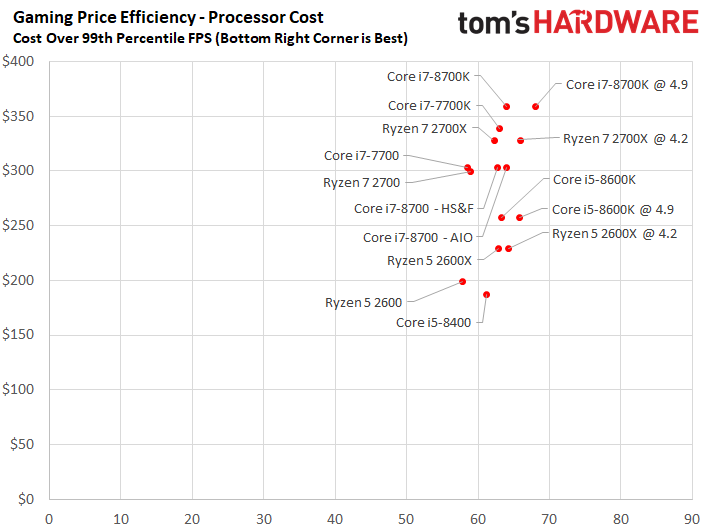
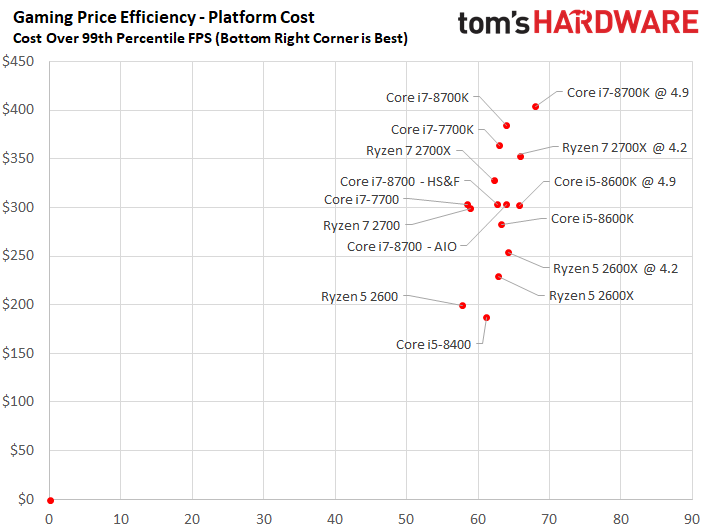
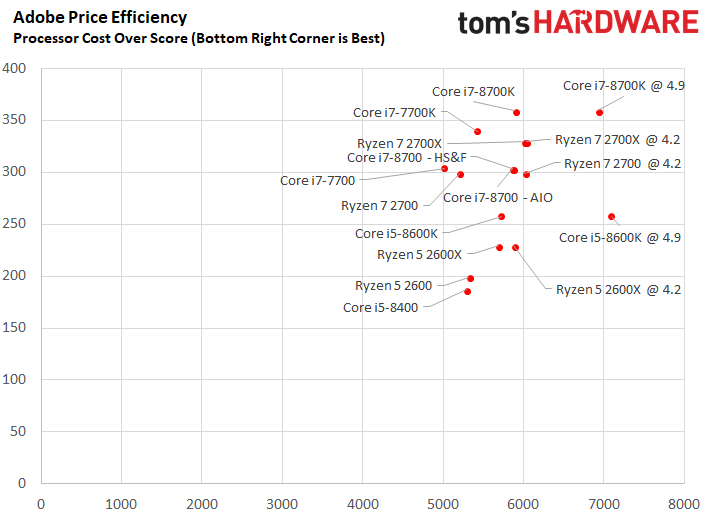
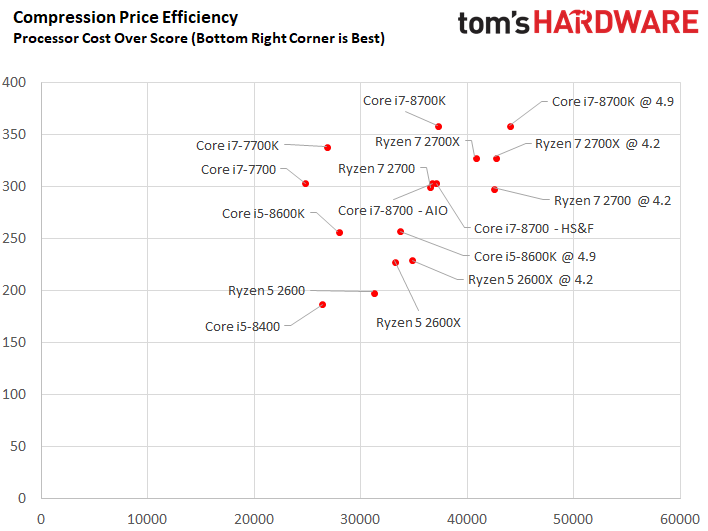
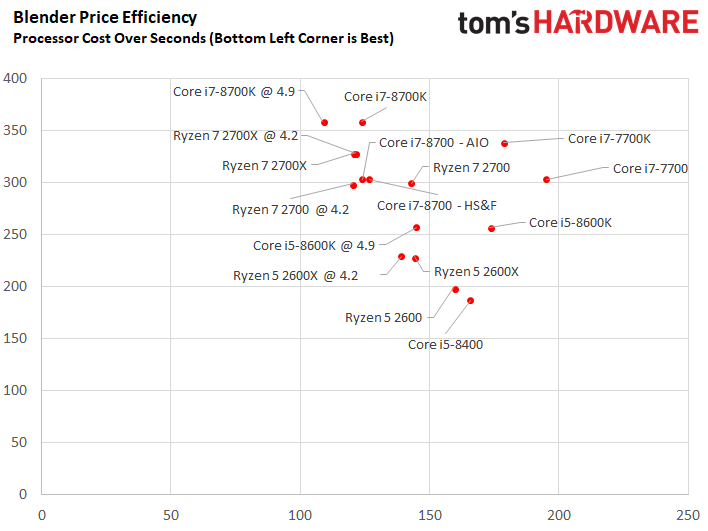
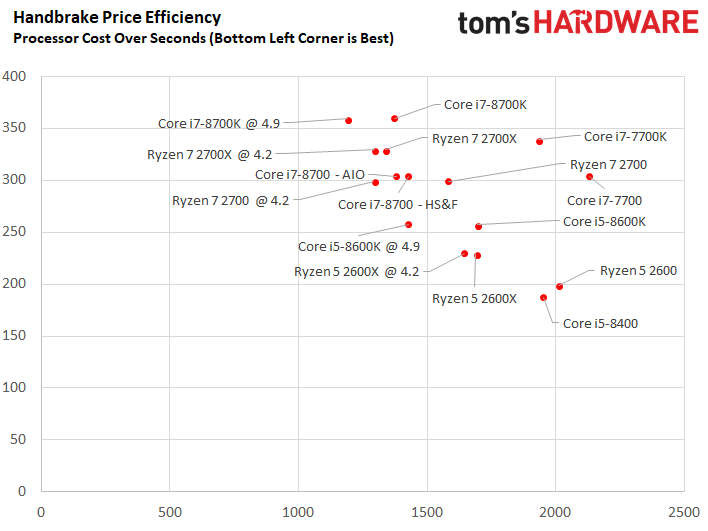
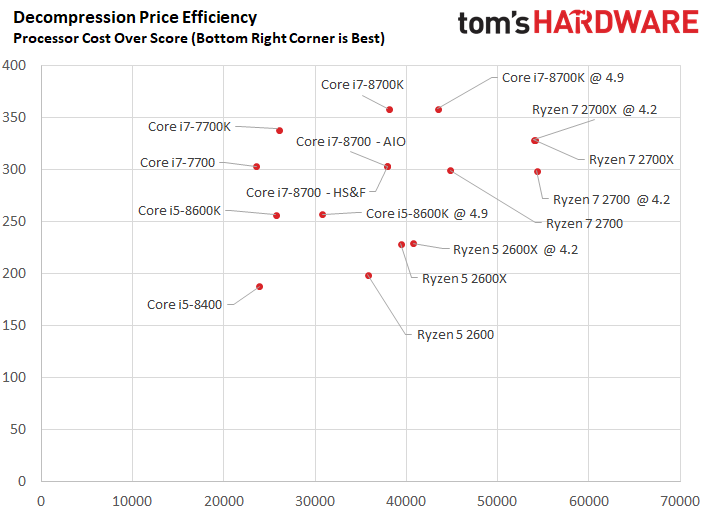
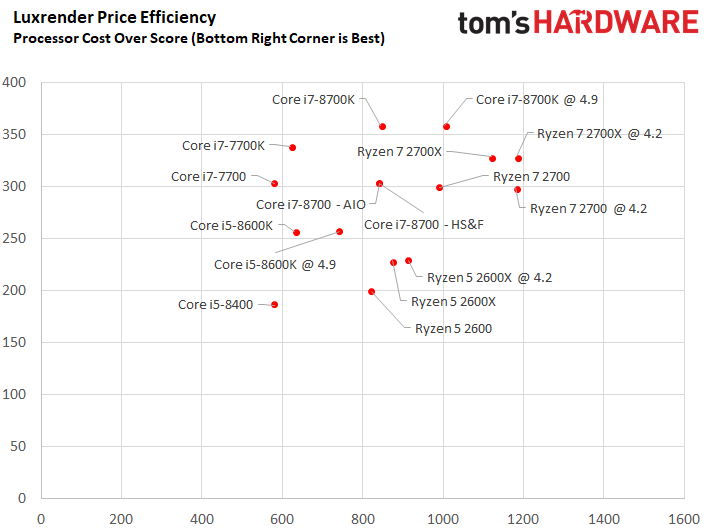
For those similar performance results, expect to spend about $50 less on a Core i7-8700. If you game at higher resolutions, the differences between CPUs shrink even more. And the -8700 looks a lot like a stock -8700K through most of our other application benchmarks, too.
Intel doesn't have a great track record for building backward compatibility into its platforms, so you are on the hook for a new 300-series motherboard, regardless of what you're stepping up from. But unless specific features of the Z370 chipset catch your eye, Core i7-8700 offers the exact same performance if you drop it onto a cheaper B-series board. That should save a few extra dollars...
...which you'll want to turn around and spend on a better thermal solution than what Intel includes with its -8700. That heat sink and fan combination is obviously a poor fit, and better thermal paste won't fix the issue. By stepping up to a sufficient third-party cooler, you won't have to worry about artificially clipping the -8700's top-end Turbo Boost bins due to overheating. A six-core, Hyper-Threaded CPU rated for 65W sounds great for performance-sensitive applications in small form factors. But power consumption definitely spikes higher under load. Apparently, many low-profile coolers lack the headroom for Core i7-8700, so do your homework before replacing the stock sink in a space-constrained environment.
In the past, we recommended Ryzen 7 2700X over Intel's Core i7-8700K due to AMD's lower price point, similar gaming performance, bundled cooler, and better benchmark results in threaded applications. We expected Core i7-8700's comparable performance and pricing advantage to level the field. However, Intel's sub-standard cooling solution means we can't recommend the -8700 without a suitable replacement, adding to the CPU's overall cost.
Get Tom's Hardware's best news and in-depth reviews, straight to your inbox.
AMD's Ryzen 7 2700 is also worth considering in this category. Its unlocked ratio multiplier and overclocking support on B-series motherboards yields a more attractive value story than what we get from Core i7-8700. Of course, if you need integrated graphics with your high-end CPU, Intel is the only game in town. And if you're looking for the best blend of price and performance for gaming specifically, the Core i5-8400 is still a favorite.
MORE: Best CPUs
MORE: Intel & AMD Processor Hierarchy
MORE: All CPUs Content

Paul Alcorn is the Editor-in-Chief for Tom's Hardware US. He also writes news and reviews on CPUs, storage, and enterprise hardware.
-
AgentLozen This CPU doesn't seem to know who it wants to target. Users who are budget constrained would get better value out of the i5 8400. Demanding gamers and power users should be looking at the i7 8700K or Ryzen 2700X.Reply
In what context does it make sense to buy this CPU? -
RyanTodd1 I brought the processor and so far i havent even begun to hit its limits. I've primarily used it for high end gaming such as the Witcher 3. Very good chip and not too costly either - considering its the new gen. Very happy, only thing is, i wish i have 50 quid more to get the 8700k! Oh well!Reply -
AgentLozen ReplyRyanTodd1 said:Very happy, only thing is, i wish i have 50 quid more to get the 8700k!
I wouldn't sweat it, RyanTodd1. Your graphics card will be the gaming bottleneck before the CPU is.
When I got my first computer in 1997, it came with a Pentium II @ 233MHz. There were 266Mhz and 300Mhz models available at the time that I wished I had instead. Looking back 21 years later, I realized that it never made a difference which one I had. I think you'll feel the same way about your i7 8700. -
Fluffy_Hedgehog Reply21087259 said:oh get real!
stock cooling is always less than prime.
*cough*
https://www.amd.com/system/files/AM4-Wraith-Cooler-Lineup-1920x631.jpg
http://www.relaxedtech.com/reviews/amd/wraith-max-and-wraith-spire-cooler/2
*cough*
you were saying? … yes those are copper plates on those coolers for the 65 and up lineup, yes they do have led and yes thost are actual copper heatpipes on the cooler that comes with the 2700x.
I know a lot of aftermarket coolers that look and perform a hell of a lot worse than what amd puts in the box.
it is only intel that puts half an ounce of third grade aluminium on top of their cpus (because they are too cheap to provide anything worthwhile I suppose …) and expects people to purchase actual cooling after the fact raising the total price of a system significantly. -
Ilya__ Reply21087183 said:This CPU doesn't seem to know who it wants to target. Users who are budget constrained would get better value out of the i5 8400. Demanding gamers and power users should be looking at the i7 8700K or Ryzen 2700X.
In what context does it make sense to buy this CPU?
I don't really agree. The difference between 8700 and 8700k is almost $100 CAD and yet the performance difference at default clocks is very small. So if I am building a machine for someone that will never overclock, save them some money and/or get the 8700 and get a good cooler instead. -
justin.m.beauvais It looks to me that the circumstances where the 8700 overwhelms its cooler are few and far between. For someone looking for great gaming performance, but might not have all the cash needed for an 8700K and cooler, they could get the 8700, not give up much performance, and just get a better cooler later when workloads catch up.Reply
The benchmarks paint a pretty nice picture of the 8700. I believe you, Tom's, when you say that the cooler can be overwhelmed, but your benchmarks don't really seem to indicate much of a loss when/if it is happening, especially in gaming.
Honestly though, why don't they differentiate the designation. Intel should have the 8700 at stock 8700K speeds, but just have the K unlocked. It isn't exactly deserving of the 8700 designation if it is clocked 500MHz lower. Just another thing Intel does that irks me. -
RyanTodd1 Reply21087440 said:RyanTodd1 said:Very happy, only thing is, i wish i have 50 quid more to get the 8700k!
I wouldn't sweat it, RyanTodd1. Your graphics card will be the gaming bottleneck before the CPU is.
When I got my first computer in 1997, it came with a Pentium II @ 233MHz. There were 266Mhz and 300Mhz models available at the time that I wished I had instead. Looking back 21 years later, I realized that it never made a difference which one I had. I think you'll feel the same way about your i7 8700.
Hopefully this is the case, although tech has come a lot further since 1997! I wasnt even born then! :)
-
george_osborne For only ~$50 more I will always go with the unlocked processor. Better base frequency, better turbo and the ability to overclock (if so desired).Reply